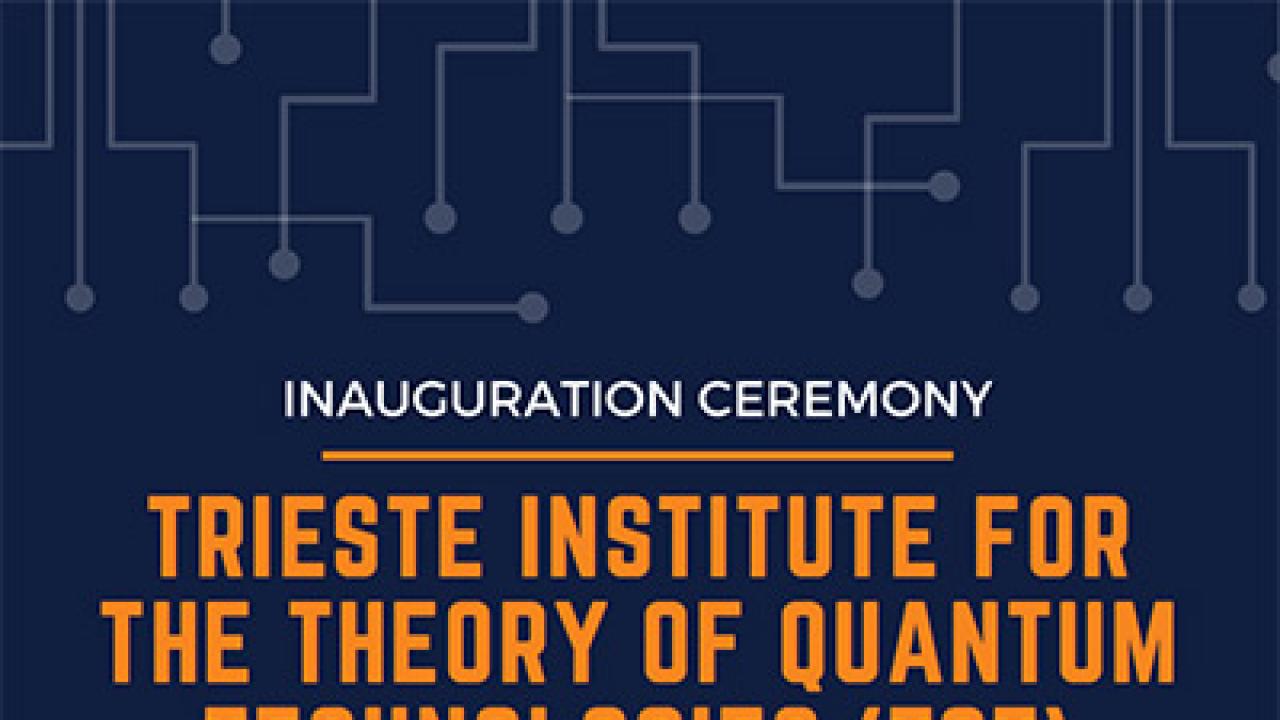
On 25 March 2019 ICTP, together with the International School for Advanced Studies (SISSA) and the University of Trieste, will launch a new institute dedicated to the study of quantum technologies.
The Trieste Institute for the Theory of Quantum Technologies (TQT) will be an international centre of excellence promoting research in the field of quantum technologies, serving as a catalyst for theoretical activities not only in Italy, but also in neighbouring and developing countries. The institute, which will be located on ICTP's campus, will offer conferences and schools in the field of quantum technologies, with high-level training and expertise. The aim is to promote collaboration between Italian and foreign scholars, both junior and senior, in order to enhance interdisciplinarity and innovation and maximize international impact.
TQT's inauguration ceremony will be held at ICTP's Budinich Lecture Hall starting at 11:00. Quantum computing pioneer Ignacio Cirac from the Max-Planck Institut für Quantenoptik, Germany, will give an inaugural lecture on "Quantum Simulations and the difficultly of solving Quantum many-body systems". The event will be livestreamed.
Quantum technologies are based on the laws of quantum mechanics, which govern physics at the atomic scale. One of their most important applications is quantum computing, which promises a future of unprecedented computing speed. Major computer manufacturers such as IBM, along with search engine giant Google, are already producing quantum computing chips that will someday drive a quantum machine. These new machines will allow us to address problems that even the most powerful classical supercomputers could never solve.
Other applications for quantum technologies include processing big data for artificial intelligence, analyzing materials and chemical reactions for the design of new energy technologies or new medications, and strengthening communications security through quantum key distribution.
"The creation of the TQT reflects ICTP's intention to evolve in response to a changing world, initiating efforts where new priorities—and new potential—in science and in the developing world demand ground-breaking research," says ICTP Director Fernando Quevedo. He adds, "Quantum technologies represent some of the most exciting frontiers in science today, and I am confident that our joint exploration of their possibilities with our SISSA and University of Trieste colleagues will create important advances in this quickly evolving field."
TQT's inauguration comes as ICTP builds on a series of recent successes in the field of quantum technologies. In November 2018, Marcello Dalmonte from ICTP’s Condensed Matter and Statistical Physics Section learned that he was among the recipients of a research grant offered by a major European initiative to develop quantum technology called the Quantum Flagship (https://qt.eu/). The European Commission has endowed the Quantum Flagship with €1 billion over the next 10 years. For the first three-year phase, Dalmonte will be acting as co-principal investigator of a research project that will focus on quantum simulation, one of the Flagship’s five research themes. Quantum simulators study quantum systems, such as the atomic make-up of materials or chemical reactions, performing tasks that are too complex for the most powerful, transistor-based classical computers.
In early 2017, ICTP researcher Antonello Scardicchio was awarded a Google Faculty Research Award for work related to quantum computing. The US$72,000 in seed funding will be used to support graduate students and postdoctoral associates working in his group.
"Researchers in computer science and physics see quantum computation as being the next frontier. Quantum computing promises a future of unprecedented computing speed," says Scardicchio, adding, "This is slowly becoming a reality, with IBM and Google already producing quantum computing chips that will someday drive a quantum machine. The creation of the first quantum computer will certainly have an impact on artificial intelligence (AI) by enabling us to solve more complex problems."
ICTP first identified AI and data science as being critical areas for research and training in 2010, while brainstorming on the contours of its new multiyear strategic plan. It is currently recruiting a staff scientist in AI and data science. The TQT will complement these activities, while providing a valuable venue for imparting cutting-edge knowledge to the thousands of scientists from developing countries who travel to ICTP each year for education and training opportunities. The Centre already has several conferences on quantum technology lined up for 2019. These include the Advanced School and Workshop on Ubiquitous Quantum Physics: the New Quantum Revolution, which was held from 18 to 22 February, and the School on Advances in Condensed Matter Physics: New Trends and Materials in Quantum Technologies, which will run from 7 to 15 May.
Related links:
















